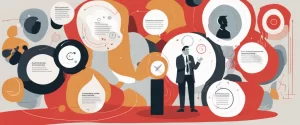
In today’s ever-evolving world, where information is more accessible than ever before, the ability to think critically and make wise decisions is of paramount importance. How can we navigate the overwhelming amount of data and perspectives, so as to make informed choices and avoid cognitive biases? This question serves as the foundation of our comparative study of two thought-provoking books: “Wiser” by Cass R. Sunstein and “Think Again” by Adam M. Grant.
“Wiser” serves as a guiding light in understanding how collective intelligence can lead to better decision-making. Sunstein, a renowned legal scholar and behavioral economist, delves into the concept of harnessing the wisdom of crowds to establish a framework for collaborative decision-making. Drawing upon a wide range of academic studies and real-life examples, Sunstein demonstrates the power of aggregating diverse perspectives, highlighting cases where it has resulted in more accurate predictions and sound judgments.
On the other hand, “Think Again” challenges our individual thinking patterns and encourages intellectual humility and openness to reevaluating our beliefs. Written by Adam M. Grant, an organizational psychologist and renowned TED speaker, this book explores how our biases and fixed mindsets hinder growth and limit our ability to adapt. Grant introduces the concept of “unlearning,” emphasizing the importance of intellectual curiosity and the willingness to question our assumptions and learn from others.
While both books share the common goal of enhancing decision-making and critical thinking, they approach it from different angles. Sunstein focuses on the potential benefits of collective intelligence, highlighting how diversity of opinion can lead to more robust outcomes. Grant, conversely, explores the barriers that prevent us from being receptive to new ideas and challenges us to embrace a mindset of continuous learning and growth.
Through this comparative study, we aim to analyze the key themes, insights, and methodologies presented in each book. By juxtaposing the two perspectives, we hope to gain a deeper understanding of how collaborative decision-making and individual reflection, in combination, can lead to more effective and informed choices. Ultimately, we seek to uncover the potential synergies between these texts and explore the implications for individuals, organizations, and society as a whole.
Let us embark on this intellectual journey, as we delve into the intricacies of wise decision-making and the art of thinking critically. By scrutinizing the principles put forth by Sunstein and Grant, we aim to contribute to the ongoing discourse on how we can navigate the twists and turns of life’s complexities and make better choices, both individually and collectively.
Brief Summary of Two Books
Wiser by Cass R. Sunstein
Wiser: Getting Beyond Groupthink to Make Groups Smarter” by Cass R. Sunstein explores the dynamics of group decision-making and offers strategies to overcome biases, polarization, and misguided judgments. Sunstein, a renowned legal scholar and behavioral economist, emphasizes the importance of diverse perspectives in improving decision-making processes.
The book delves into cognitive biases that influence group discussions, such as confirmation bias and the illusion of invulnerability. Sunstein explores the concept of “groupthink,” where individuals prioritize maintaining group cohesion over critical analysis and objective reasoning. He also offers examples from various fields, including business, politics, and intelligence, to highlight the detrimental effects of groupthink and the dire consequences it can have.
Sunstein introduces several approaches that can lead to smarter group decisions. He emphasizes the importance of inviting a wide range of viewpoints and encouraging dissent to challenge the dominance of popular opinions. He explores the role of technology platforms in shaping group dynamics, advocating for their responsible design to counteract echo chambers and promote diverse perspectives.
In “Wiser,” Sunstein provides practical tools such as prediction markets and red teams that can help groups make better decisions. He stresses the significance of deliberation, where individuals engage in open, honest, and respectful conversations, allowing for the testing of ideas and the identification of blind spots.
Ultimately, “Wiser” provides a compelling argument for the importance of collective decision-making and offers actionable strategies to foster smarter group outcomes, whether in politics, organizations, or everyday life. It serves as a call to embrace diverse perspectives, challenge biases, and harness the collective intelligence of groups.
Think Again by Adam M. Grant
Think Again: The Power of Knowing What You Don’t Know is a book written by organizational psychologist Adam M. Grant. The book explores the concept of rethinking and the importance of intellectual humility in personal and professional growth.
Grant argues that our society tends to reward individuals who remain confident and unwavering in their beliefs, even when faced with conflicting evidence. However, this mindset can limit our potential for learning and adaptation. He believes that to truly thrive in a rapidly changing world, we need to develop the ability to think again and challenge our own assumptions.
The book guides readers through the process of rethinking by highlighting various mindsets and strategies. Grant emphasizes the importance of being open-minded and embracing curiosity, as these qualities allow us to explore new ideas and challenge our existing beliefs. He shares stories of individuals who have successfully embraced this approach, such as scientists, entrepreneurs, and leaders, and draws lessons from their experiences.
Grant also delves into the psychology behind why people resist changing their minds. He explores topics like confirmation bias, cognitive dissonance, and the fear of being wrong. Through compelling anecdotes and studies, he shows how these cognitive biases can hinder personal and professional growth.
Think Again also provides practical tools and techniques for individuals to cultivate a mindset of continuous learning. Grant outlines strategies for conducting productive debates and engaging in constructive feedback. He also emphasizes the importance of seeking out diverse perspectives and surrounding oneself with people who challenge assumptions.
Overall, Think Again encourages readers to embrace intellectual humility and embrace the process of rethinking. By adopting a mindset of curiosity and openness, individuals can enhance their creativity, decision-making, and ability to adapt to new circumstances. The book aims to empower readers to challenge their own beliefs and embrace change, ultimately leading to personal and professional growth.
Comparison between Two Books

Similarities in decision making
Both “Wiser” by Cass R. Sunstein and “Think Again” by Adam M. Grant explore decision making and the cognitive biases that often hinder our ability to make rational choices. Here are some similarities between the two books:
1. Cognitive biases: Both books delve into the numerous cognitive biases that affect decision making, such as confirmation bias, anchoring bias, and availability bias. They highlight how these biases can distort our reasoning and prevent us from seeking out alternative perspectives.
2. The importance of open-mindedness: Both authors emphasize the necessity of being open to different viewpoints and challenging our own assumptions. Sunstein and Grant argue that by deliberately considering opposing views, we can make more informed and rational decisions.
3. Group dynamics: Both books discuss the influence of social dynamics and groupthink on decision making. They highlight the dangers of echo chambers and the need to diversify sources of information to avoid biased decision making.
4. Feedback and learning: Sunstein and Grant emphasize the power of feedback in decision making. They stress the importance of continuous learning and adaptation, acknowledging that revisiting and updating our decisions based on new information is crucial for making wiser choices.
5. Expertise and humility: Both authors address the tension between expertise and humility in decision making. They argue that while it is important to seek input from experts, it is equally important to remain humble and recognize our own fallibility.
6. Decision architecture: Sunstein and Grant explore the concept of decision architecture, acknowledging that how choices are presented and structured can significantly impact decision outcomes. They discuss ways to design decision-making processes that mitigate biases and promote more thoughtful choices.
7. The power of self-reflection: Both books underline the significance of introspection and self-reflection in decision-making. Sunstein and Grant encourage readers to introspect, examine their own motivations, and challenge their preconceived notions to make better decisions.
While there may be some differences in approach and focus between “Wiser” and “Think Again,” the underlying theme of improving decision making through self-awareness and critical thinking processes unites these books.
Divergences in decision making
Wiser by Cass R. Sunstein and Think Again by Adam M. Grant are two renowned books that delve into the subject of decision making, albeit from slightly different perspectives. While both authors aim to enhance the decision-making abilities of readers, they diverge in their approaches and focus.
In Wiser, Cass R. Sunstein explores the concept of collective intelligence and how groups can make better decisions when they collaborate effectively. Sunstein emphasizes the importance of diverse perspectives and the benefits of bringing together individuals with varied experiences and backgrounds. By examining decision-making processes in various settings like juries, political systems, and organizations, Sunstein provides practical strategies to harness the collective wisdom of groups and improve decision outcomes.
On the other hand, Think Again by Adam M. Grant approaches decision making from an individual level, focusing on the importance of intellectual humility and being open to changing our minds. Grant explores how cognitive biases, stubbornness, and a fixed mindset can hinder effective decision making. He encourages readers to challenge their existing beliefs, seek out opposing viewpoints, and continually refine their thinking. Grant argues that being willing to reconsider, and even revise, our opinions can lead to better decisions, both personally and professionally.
The divergence in approach between the two books lies in their respective emphasis on collective decision making (Wiser) versus individual decision making (Think Again). While Sunstein advocates for the power of diverse groups in enhancing decisions, Grant emphasizes self-reflection and openness to new ideas as the key to making better choices.
Moreover, Wiser primarily focuses on the process of decision making and the benefits of collective wisdom, whereas Think Again delves into the psychological aspects of decision making, including cognitive biases and fixed mindsets. Grant’s book incorporates personal anecdotes, research studies, and psychological insights into decision making, while Sunstein presents a more analytical and structured framework for improving collective decision making.
In conclusion, while both Wiser by Cass R. Sunstein and Think Again by Adam M. Grant aim to enhance decision-making abilities, they diverge in their approaches and focus. Sunstein highlights the power of collective intelligence, emphasizing diverse perspectives and effective collaboration, while Grant focuses on individual decision making, encouraging intellectual humility and openness to changing one’s mind.

Conclusion
Both “Wiser” by Cass R. Sunstein and “Think Again” by Adam M. Grant are highly praised books that offer valuable insights. Ultimately, the choice between the two depends on your individual preferences and interests.
“Wiser” focuses on improving decision-making and explores how groups and individuals can make better choices. Sunstein delves into various decision-making strategies, highlighting the importance of diversity and collaboration among experts. If you are intrigued by psychology, social dynamics, and the ways in which groups can make wiser decisions, “Wiser” would be a great choice.
On the other hand, “Think Again” by Adam M. Grant centers around the concept of rethinking and unlearning ingrained beliefs that hold us back. Grant emphasizes the importance of open-mindedness, intellectual humility, and curiosity in developing more flexible thinking habits. If you are interested in personal growth, expanding your perspective, and challenging your own assumptions, “Think Again” may be the better option.
Both books offer unique and valuable insights, and their worthiness depends on your specific interests. Consider what aspect of decision-making or thinking you would like to delve into further, and choose accordingly.



